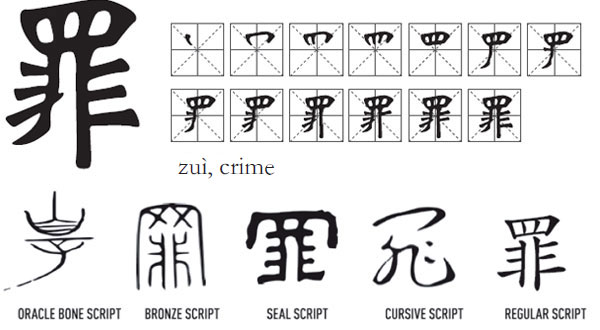Let the character fit the crime
Updated: 2014-05-16 07:54
By Huang Weijia and Liu Jue (China Daily Europe)
|
|||||||||||
|
Publicity for the detective-psychological thriller film Seven, whose Chinese title is 七宗罪. Provided to China Daily |

How an emperor's distaste put a different complexion on the language
The human impulse to break the law has been around since law began, and in ancient China, the price paid was brutal. The lethal injection of today is lenient compared to the age when the character 罪 (zuì) was first scripted. When it was carved as bronze script during the Warring States Period (475-221 BC), the character consisted of a nose-shaped radical on the top and a knife-shaped radical on the bottom, 辠, meaning punishment by "cutting one's nose off".
As one might imagine, with such a vicious punishment, anecdotes abound. During the Warring States Period, in the royal court of the Chu State, Zhen Xiu was the most loved concubine of the king, but her striking beauty was matched by her sadistic temperament. When the king took a new concubine from the State of Wei, Zhen became jealous. Feigning friendship, Zhen offered the new concubine advice on how to keep the king interested. "His majesty doesn't like your nose. You should cover it in his presence," she said. The gullible new concubine then covered her nose with her sleeves every time the king visited her. After a while, the king, baffled by the gesture, consulted Zhen: "Why does the beauty from the State of Wei cover her nose whenever she's with me?" Zhen replied: "I'm afraid she is disgusted by your majesty's body odor." Hearing this, the king was furious and ordered the beauty's nose cut off, putting Zhen once again in her lord's good graces.
In most cases, the punishment of cutting off a criminal's nose, or just branding their face, was not just to inflict pain; rather, it was to mark the person as a criminal, permanently. As such, the name of this particular punishment began to represent the concept of crime in general. Because the original character took on the meaning of crime, the original punishment was represented by a newly created character, 劓 (yì).
Later, when the Emperor Qinshihuang founded the Qin Dynasty (221-206 BC), he called himself "the Initial Emperor" (始皇帝 Shǐhuángdì). It was said that he found " 辠" resembled "皇" (emperor) in shape and ordered it to be abandoned. As a result, a new character, see bronze script, was created to represent crime. Consisting of 网 (wǎng, web) on top and a phonetic radical, 非(fēi), on the bottom; the character lost its original pronunciation, but it maintains its original form today. Those committing crime will quickly be captured in a web.
Whenever you see 罪 in a word or phrase, expect the worst. Committing a crime is 犯罪 (fànzuì), and when you swap those characters, you get "the criminal", which is 罪犯 (zuìfàn). A criminal charge is 罪名 (zuìmíng), such as 诽谤罪 (fěibàngzuì, libel), 盗窃罪 (dàoqièzuì, larceny), 杀人罪 (shārénzuì, murder), and many others. For murderers, you can say their crime is the most heinous with 罪大恶极 (zuìdà è jí) or describe them as 罪孽深重 (zuì niè shēnzhòng, deeply sinful). In fact, 罪 stands for both the religious concept of "sin" and the legal concept of "crime". A sinner is 罪人 (zuìrén) while 罪孽 (zuìniè, sin) always carries the meaning of retribution. When it comes to punishment for extremely vicious crimes, many believe 罪不容诛 (zuì bù róng zhū, even ending their lives will not make up for the loss), or 罪该万死 (zuì gāi wàn sǐ, worth dying 10,000 times).
When the police crack a case, the culprit is called 罪魁祸首 (zuì kuī huò shǒu, literally, the chief of the crime and leader of the disaster) if you want to be dramatic about it. Evidence of a crime is 罪证 (zuìzhèng). And when a criminal is roundly punished, you can say 罪有应得 (zuì yǒu yīng dé, a punishment well deserved). In some cases, criminals can exchange evidence and service for a lighter sentence, which is called 立功赎罪 (lìgōng shúzuì, performing meritorious service to atone for one's crimes).
In some cases, 罪 means misconduct and mistakes, such as in 归罪于人 (guīzuì yú rén), which means "to blame other people for mistakes or negative results". The character also means "pain and hardship" as in 受罪 (shòuzuì, to suffer from pain and hardship). You can also use the word in unpleasant or uncomfortable situations, for instance: 他晚上打呼噜很厉害,跟他住在一起真受罪 (Tā wǎnshàng dǎhūlu hěn lìhai, gēn tā zhù zài yìqǐ zhēn shòu zuì, he snores heavily; to live with him is such suffering). Or it can be used in this context: 她看电影总喜欢哭,跟她一起看电影简直是受罪。(Tā kàn diànyǐng zǒng xǐhuān kū, gēn tā yīqǐ kàn diànyǐng jiǎnzhí shì shòuzuì, she cries a lot during movies; to watch with her is such suffering.)
This character follows crime from the deed to prison and is indelibly linked to a less forgiving time in Chinese history. From lopped off noses to insecure emperors and from murders to mistakes, 罪 is a character one does not often look forward to seeing.
Courtesy of the World of Chinese, www.theworldofchinese.com
The World of Chinese
(China Daily European Weekly 05/16/2014 page27)
Today's Top News
Egypt angered about China's fake Sphinx
Poroshenko wins Ukraine election - exit poll
Euro elections reflect EU consensus
Pope calls for Israel-Palestine peace
Click profit online in China
Ukraine's presidential polls backfire
EU-wide elections could shake up the bloc
Beijing urges to intensify terror fight
Hot Topics
Lunar probe , China growth forecasts, Emission rules get tougher, China seen through 'colored lens', International board,
Editor's Picks

|

|

|

|

|

|






